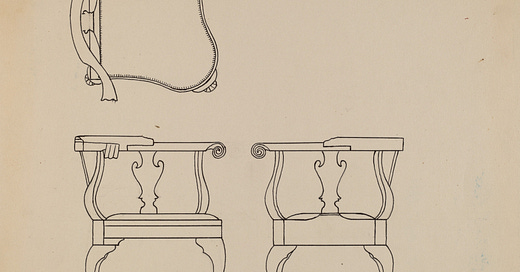This is Five and Nine, a podcast newsletter at the intersection of magic, work and economic justice. Welcome to Season 1, Episode 6, Part 1. We are pleased to share we are now available on Apple Podcasts.
Listen to the podcast now, or read the transcript below, or both!

Resources
Music and Words
All by myself, composed by Irving Berlin and sung by Aileen Stanley in 1921
The gate, the key, the passage, by Little Red Tarot
Gorgon’s Tarot, by Dolores Fitchie
Tarot Cards
Eight of Cups
Five of Swords
Two of Pentacles
The Hermit
Transcript
Ana: This is a special edition of Five and Nine, with Dear Abby-style discussions about work and career with some tarot mixed in. We received some great guest submissions that we're discussing in this episode. These have been recorded in one sitting, but we had so much to say about the two queries that we split up the episode. For the best experience, be sure to listen to both parts.
Dear Five and Nine,
I work in an international team. People live in different places around the world, but the working style is very Western. In other words, the squeaky wheel gets oiled. We have to constantly adapt to others' work habits. I wonder how we, those of us who have a harder time trying to feel entitled or confident, could communicate our needs effectively, so that does not make us feel uncomfortable.
Signed,
Corner Girl
Oh, Corner Girl. I really feel you. I really feel you. And it's something I've struggled with myself, even as someone who has grown up in the West.
Dorothy: I think as someone who is actually on the opposite end of the spectrum of Ana, let me just put it this way. Yes, I was that child in Catholic school that had three checks behind their name because I talked too much. I think something that other people could do who are —- and we hear this all the time, the three of us in the different environments that we work in, stepping up, stepping back, et cetera. But I think a lot of it too is having the fortitude to be able to meet people where they're at and allowing folks who admittedly have spoken to me about having issues such as Corner Girl, and almost like teaming up and collaborating in this very different way.
So saying, well, what ideas do you have that need a little bit more preparatory time in a meeting and talking to those individuals and saying, would you like me to not speak on behalf of you, but to say, why don't we hear from folks who aren't as vocal?
I think as someone who does historically talk a lot, I've learned to do that for other people. And it's really humbled me a lot and also taught me to be much more of a deep and active listener. I wonder if corner girl can actually find those folks, who are making it an intentional practice to be active listeners.
Xiaowei: I really resonate with Corner Girl. In so many ways, I feel like I also am the person at a meeting who always needs time to think about things. I never feel like I can react to things in real time. I need some time to like, process, to understand, to really analyze and be methodical.
One of the ways that — this is very Scorpionic. I was talking with someone yesterday about how we're so against classification ethically in so many realms, but when it comes to the Zodiac, we're always talking about it. As a deep listener and someone who's quiet, there's other ways of wielding power.
Even just remembering when I was in middle school, I started this petition at school, but I didn't say it was from me. We ended up getting a hundred signatures or something, and I left it at the principal's door. And there was like this whole thing that like came out of it, but I never like fessed up to being the person who started the petition.
And in previous workplaces, one of the issues that we had was workplace equity of all different kinds. But I started a spreadsheet where people could anonymously put their salaries and people were like, did you start this spreadsheet? And I was like, no, I didn't, but eventually it became a vehicle for people to start to have these discussions around gender equity and pay parity at the workplace. So I think there are these ways of also wielding power and trying to get change done that maybe don't necessarily involve speaking up in that way. Everyone has their different ways of approaching things.
Ana: And so much seems to depend also on the move up, move back framework. If the folks who do take up more space, if they're willing to move back, if they're willing to cede space, one thing that's been interesting for me to see is, just as a quiet person myself, seeing how things like Slack and emails sometimes (sometimes!) enable different types of conversation. Or in a Zoom meeting or a Google Meet meeting, the more quiet people will actually use the chat function to get their ideas out even while people are talking.
So much depends on the actual work environment, but sometimes the kind of text-based communication, just like what you do with the spreadsheet, Xiaowei, becomes a space at least a different type of conversation where people can take up a little bit more space through texts. But of course, power dynamics and cultural dynamics so often come into place.
Xiaowei: Yeah. Agreed. You have to have leadership that's actually willing to listen in order for any of this to happen. Yeah.
[7:23] A Reading for Corner Girl
Ana: Should we do a reading for Corner Girl?
Xiaowei: I can start with the first card. So the spread that we're doing is a spread that Ana has done before that I really appreciate — Gate, Lock and Key. How would you describe the gate, Ana?
Ana: I think of it as the invitation. This is the doorway that you're being invited to open.
Xiaowei: Okay. So what is the doorway that corner girl is being asked to step through?

Oh, interesting. I pulled the eight of cups. In the Rider Waite, which I'm using today, it is a person in a red cape, with their back turned towards eight cups. And they're journeying under an eclipse. So it's a moon that has eclipsed the sun, so intuition that has eclipsed reason.
Dorothy: The lock placement in this spread is — I don't want to call it a barrier. And I too, along with Xiaowei really appreciate this spread that Ana has done with me as well, because it forces, or it has forced me to think about the lock as a way of, well — how might we confront a challenge that we're facing?
Do you want share anything else about the lock?
Ana: No, but I've been trying to find where I learned this. I haven't found it. I've been Googling it. It just feels important, as you all have shared with me, is to share our inspirations. And the closest I could find for the spread was on the Little Red Tarot blog, where Beth Maiden writes about the gate, the key, the passage as a spread. I think I was certainly influenced by that. I'm not quite sure where exactly, the gate, the lock, the key spread, came into my mind.
Xiaowei: I will say that I actually have done a ritual before that I read, I can't remember where, that was not tarot. That was the gate lock and the key. And it was about infusing. So I literally had to take an actual key and infuse intention into three objects. And so then afterwards, I would carry the key around to remember what was the symbolic and actual key. So I feel like it's maybe a quite old witchcraft thing, maybe.
Dorothy: But you know what else I thought of related to the lock. Why does it have to be just one key? Keys can be copied too, do you know what I'm saying? I'm also just being practical. When you think of when you give a key to someone that you trust, if you're giving them the power, as Xiaowei brought this up earlier, then not only are you entrusting this person and not only do they know and have the resource to unlock the lock with the key that they have. It's almost a way of honoring. I don't think of the lock as something necessarily restrictive, and it can be something that can be untangled, so to speak.
And I guess I should move on to the card that just kind of stuck itself out as I was shuffling. And I'm using the Gorgon’s Tarot by Dolores Fitchie. It's black and white and only a few cards in the entire deck have hints or touches of red.

Corner Girl, we need to talk. Your lock card is Five of Swords. The way that the five of swords appears on the Gorgon’s Tarot is a feminine figure wearing a long black dress almost as if in a crucifix position where her arms are outstretched. There are four swords that actually form a diamond around her. So they're surrounding her, but the fifth sword, it goes straight through her heart. And it is against a backdrop of mountains and land. And then there’s one mouse and one… it looks a little bit like a leopard or a cheetah that are actually looking on to the feminine figure.
Ana: I'll draw the key, and to your point, Dorothy, actually, sometimes when I'm doing the spread, I'll draw two keys or three keys. Depending on my intuitions, and the key position is exactly it. I think of it as a way to work through the block to get to the invitation. And so I'm using the Rider-Waite-Smith, and I'm pulling two cards.

Now, the two cards are that I've drawn are the Two of Pentacles and The Hermit. So the Two of Pentacles is a figure that looks like they’re juggling two pentacles or coins in their hand. They're larger pentacles, and there's kind of a figure eight or infinity symbol that’s connecting those two coins. In the background are ships, big waves. The figure seems to be dancing. They’re standing on one foot and they're looking downward at the Pentacles.

The Hermit is a figure that is an old bearded figure, a kind of masculine figure who is wearing a hood and a robe and is standing in what looks like the snow. And the figure is holding up a lamp, and that lamp contains a little star inside. And it's often interpreted that this person is in the night walking through a dark place.
And so it seems like the the full spread here — we have Eight of Cups as the gate, the invitation. The Five of Swords as the lock, what we might think of as a blocker or something to work through. And the key, possible way forward, is a Two of Pentacles and The Hermit.
Xiaowei: I guess in the Rider Waite, the progression of the Five of Swords is the first card that’s someone in a red cape journeying. And then the second, the lock, the person in red is now wearing a green tunic on top and looking off. I had these two other people in this sort of expression of like, oh, I'm just looking on at others.
And then the last two keys, the person in red is now playfully juggling, and behind them is that figure of the hermit who's in this gray cape now. And I love that. It's also like this story really. It's almost like a comic.
Dorothy: I think what's interesting about the Five of Swords is this idea of… you never know if you're the “winner”, or the person who's been, or people who have been defeated. You actually don't know till much later on, when you think about different life experiences and things that you might have gone through.
And again, I know Corner Girl is not a student, but I think I go back to this because this is stuff we learn when we're young: you need to be bold, you need to just speak. I'm being told I need to do all these things and be all of these things, when these things aren't actually encouraged. And so sometimes when I look at the Five of Swords, I wonder if Corner Girl could look at past experiences where her perceived introversion or desire to be quiet and to be still, and to be like, let me step back and be an observer when those instances have actually served her well, because sometimes we're not asked about those.
We don't seek that wisdom from our prior selves to actually inform what might help us in the current position. When I think of the Five of Swords, it's like someone can win a victory, but did they really win in the long run? You know? But again, you don't know that.
Ana: Right now, maybe that's your communication style or it could be the working environment itself. Is this the right working environment for you? Is this the place that is right for you? And of course we face so many constraints. It's not easy to just pick up and leave, but it seems to be a question here. Then are you ready for what might be some discomfort on your side as you practice a different type of communication style and of course, discomfort on the side of others, as well as they try to adapt to maybe a different side of you that they haven't seen?
Maybe you're asking the leadership to make more of, if not an accommodation, then a culture shift that includes a spirit of moving back, of active listening, of giving space and sharing space. Either way, that requires a little bit of push and pull. And so to me, part of what I see with this is, there's a Two of Pentacles which will require some juggling of yourself and your own needs, but also on the part of the organization, can there be a balance, can there be a workplace shift? It’s unclear. Can that workplace provide that balance for you? And if not, I think of The Hermit as maybe it's time to move on. Something that, to me about The Hermit is that holding a lamp out into darkness, unsure of where he or she is going, is a scary place to be. It's a scary leap, but sometimes our work environments are not the right place for us. Even if the work itself is nice, but if the work environment is not supportive, then it may be time to start making preparations for how you can be economically secure enough, ow you can have all your needs met, whatever it is you need from work for your material health and well being, to then make that leap, in whatever way that looks for you.
Dorothy: Even thinking through and listening to Ana and Xiaowei talk about the cards that have been laid out, even though we're in three different places, actually we're everywhere, everything all at the same time, all the time. I feel, Ana, you summed it up really well about the choices that Corner Girl has, because there are choices. She could participate in the changes in a variety of ways that both Xiaowei and Ana have already stated. I just think that was a very fascinating observation of a very circular kind of reading and that's.
Xiaowei: I really love what you also just said too, Ana, about culture change. And I think it's so funny because, like, sorry, I've been writing about power all day, so I'm just going to go for it. Corner Girl mentioned Western working culture. It's very contradictory, right? Because on one hand it is the supposed narrative about like, oh, if you're loud, if you're really filling up the room, that's how change gets done.
But when you look at it, it's always a lot of closed doors, like one-on-one. The one person making that meeting with a CEO is like, Hey, just so you know, people are unhappy about this thing. And so it is very contradictory. Behind closed doors, things get moved, and then also this narrative of being really loud. And so I think part of changing workplace culture is also sitting with those two opposites and also thinking about how, as you shift culture, your working style may or may not fit with those two different poles.
Dorothy: Yes, a hundred thousand percent to what you're talking about. And I also wanted to add, I cannot help, but think of the way that even Corner Girl is thinking about this, because I don't know if this was inadvertent. But I'd like to think of it as a beautiful slip — is the last question in the letter was, I wonder how we who have a harder time trying to feel entitled or confident could communicate our needs?
And a part of me is just like, wow, Corner Girl, you're actually trying to figure this out, not just for yourself, but other people. And that's a way of showing a type of solidarity that is oftentimes unseen, because you see maybe other people having to confront this themselves as well. And I'm wondering if you've spoken to those other individuals, and what would it look like if you had that conversation about how to best have, not just your needs met.
But — whether you want to call them coworkers, colleagues, comrades — what would it look like if you started to have these conversations with other individuals that have also experienced this in the workplace before you start to make a decision about whether it is the right place for you?
Ana: Sometimes it's not the right fit, but there's always the question of what values have you gained from this? What have you learned about the things to ask for in a future workplace? And what to look for? There are all tough questions. Not everyone has as much flexibility with their workplace as others. And that's a question only you can answer. But often talking to other people, hearing their experiences, and learning from each other is a great place to start.
[22:20] How to Interpret the Reading
Ana: And just a reminder is that in tarot, this is not a prescription. These are not, predictions. These are just insights. Ultimately we have free will, and you all know your context so much more than we do. These are just perspectives that we hope to share, just to challenge thinking, bring perspectives to our audience. But ultimately these decisions are ones that you make.
Dorothy: I think the first thing that comes to mind is understanding that the tarot is a lot like that really quiet best friend that just just drops truths when you least expect it. So the language or the communication is coming through the symbology as well as the naming of the card.
I think of someone like my grandfather, my maternal grandfather. When I was growing up, his people would actually ask for his opinion. And he would say just a few words. And I'm not that way. I know I'm a person of so many, oftentimes flowery words. And my students, I say, okay, one last thing. And then my students have actually said, Dorothy, you say that all the time, and it ends up being five last things. Is this really the last thing?
But that's what tarot is. It's this friend that doesn't have to say much, but it's also not prescriptive. It's never going to tell you what to do. It allows you to see that you have the answers inside yourself. I almost feel like I'm saying everything and nothing at all, but that's the best way to describe interpretation, like reading generously and also reading from a place that is for the highest good in your life. Not something where you are espousing or imbuing, and people read differently. But if you know you're in a high octane, emotional state, sometimes it's good to maybe have someone that can listen. And tarot can offer that, but I think the danger, and I use that word very intentionally is that espousal of, well, this is what that means, and it has to mean that.
And it doesn't. And that's what I mean by reading generously. One of my mentors always reminds me of doing that with text. How do you read this generously? Even if you disagree, even if you're like, oh, the Death card. Nope.
What does it mean to read the Death card generously?
Xiaowei: Plus one to everything Dorothy said. In many ways, tarot is like a good therapist where, you that moment when you're talking to your therapist and you just kind of see the slight eyebrow raise? And your therapist is like, slight eyebrow raise, So you're telling me that you want X, but you've been doing Y. And Y seems very… going in the opposite direction of X. How do you feel about that?
And I feel like tarot is just that. How do you feel? Maybe you just want to keep on going in the opposite direction.
🎙️ Listen to the Five and Nine Podcast
Subscribe now to get our podcast. As a podcast newsletter, Five and Nine brings the conversation to text and sound. All podcasts are fully transcribed to encourage accessibility.
Five and Nine is a podcast newsletter at the intersection of magic, work and economic justice. We publish “moonthly” — a newsletter every new moon 🌚 and podcasts on full moons 🌝 — , and we provide an ongoing critical discussion through readings, reflections and debate. In this new world, we’re all rethinking the meaning of work and justice in our lives. Our lives and livelihoods are more essential than ever in identifying ways forward for society that can be grounded in care, compassion and sustainability.
During our pilot period, every issue of Five and Nine is free, and after the pilot, we’ll publish more regularly, with paid and free options. Learn more about us here.
Directors of Magic. Dorothy R. Santos and Xiaowei R. Wang
Creative Director. Xiaowei R. Wang
Producer. Ana Mina (aka An Xiao)
Subscribe now to get our next newsletter. As a podcast newsletter, Five and Nine brings the conversation to text and sound. All podcasts are fully transcribed to encourage accessibility.











